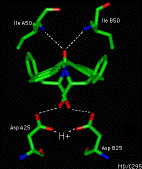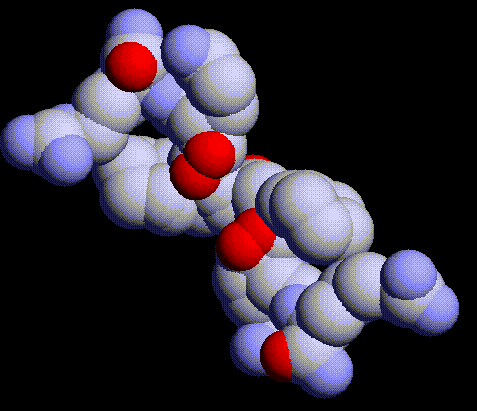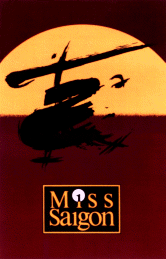Can protease inhibitors get rid of HIV? The inhibitors are not
cure for AIDS and it cannot destroy all the viruses. However,
these drugs can reduce the number of viruses by %99. There
are some infected cells that are not actively making new viruses.
These are said to be "dormant" or "latently infected" cells.
Therefore researchers doubt that any one drug can eliminate the HIV
totally. Combination drug therapy seems to be the
best way to fight HIV presently. In those people who have recenly
been infected with the HIV virus, the combination drug therapy can
result in almost no sign of the virus in the blood.
Saquinavir was built using Spartan. All PDB files were obtained from Moleules R Us
Word List
AIDS: Advanced infection with HIV, marked by certain conditions that do not occur in people
with healthy immune systems, or by a decrease in CD4 cells below the level of 200 copies per
microliter of blood.
CD4 cells: White blood cells that help direct the body's infection-fighting cells. They're named
after the CD4 molecules they carry on their surface. Also called T helper cells.
CD4 count: The number of CD4 cells in a tiny drop of blood (a microliter, or about 1/5000th of
a teaspoon). Because HIV attacks CD4 cells, their number falls as the infection gets more
serious.
clinical trial: A study of the effects of one or more drugs in people.
enzyme: A kind of protein that causes chemical changes inside cells.
genetic: Having to do with genes, tiny segments of chemicals inside all viruses and cells that
carry the information needed to make proteins that perform basic functions (such as the
replication of viruses).
HIV: The human immunodeficiency virus. It attacks infection-fighting blood cells (CD4 cells)
and other cells and causes AIDS.
immune system: The network of organs and cells in the body that recognizes and fights off
infections and other "foreign" invaders.
infectious: Having the ability to infect (get inside) uninfected cells.
protease: An enzyme that HIV uses to make new copies of itself inside infected cells.
protease inhibitor (PRO-tee-aze in-HIB-it-ter): A drug that stops protease from making
new copies of HIV that can infect other cells.
proteins: Complex compounds that are a major part of cells in all plants and animals. Their
makeup depends on the particular genes inside each cell. The genes of viruses such as HIV also
make specific proteins inside infected cells.
proteinase inhibitor: Another name for protease inhibitor, often used in Europe.
resistance: The ability of HIV to change its chemical (or genetic) structure so that it resists the
effects of drugs.
replication: The process by which HIV makes new copies of itself inside infected cells.
reverse transcriptase (ri-VERS tran-SKRIP-taze): An HIV enzyme that lets the virus's
genetic message get inside the genetic machinery of infected cells.
reverse transcriptase inhibitor: A drug that stops reverse transcriptase from doing its job
efficiently inside infected cells.
side effects: The unwanted (sometimes harmful) effects of drugs.
T helper cells: White blood cells that help direct the body's infection-fighting cells. Also called
CD4 cells.
 Table
of Contents
Table
of Contents
 HIV
Protease
HIV
Protease
 HIV
Protease Inhibitors
HIV
Protease Inhibitors
 Saquinavir
Saquinavir
 Conclusion
Conclusion
 Grace's
Homepage
Grace's
Homepage
 Table
of Contents
Table
of Contents